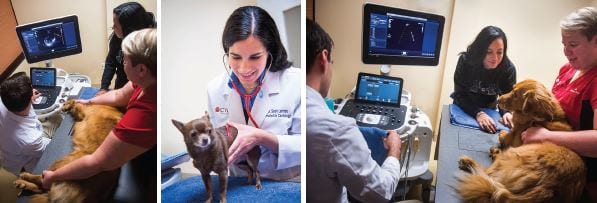Checking Out the Important Providers Provided by a Vet Cardiologist: Comprehending Ultrasound and CT Scan Techniques
Veterinary cardiologists play a vital function in the wellness of animals by detecting and treating different heart problems. They utilize sophisticated imaging techniques, such as cardiac ultrasound and CT scans, to supply exact evaluations. Each approach has its unique advantages and applications. Comprehending these methods is crucial for pet owners seeking the best look after their companions. What elements should animal owners consider when choosing in between these analysis devices?

The Function of Vet Cardiologists in Pet Healthcare
Veterinary cardiologists play a crucial duty in the healthcare of animals, concentrating especially on detecting and dealing with heart-related conditions. They possess specialized training that allows them to translate complicated analysis examinations and determine numerous cardio concerns. These specialists utilize advanced techniques, such as echocardiography and electrocardiography, to evaluate heart function and structure accurately.Veterinary cardiologists also develop tailored treatment plans that might consist of drugs, way of living alterations, and, sometimes, medical treatments. Their proficiency encompasses educating animal owners about heart health, emphasizing the significance of regular check-ups and very early discovery of prospective issues. Partnership with general veterinarians is vital, as it guarantees thorough look after family pets with presumed cardiac issues. By offering specialized solutions, vet cardiologists considerably improve the quality of life for animals and provide satisfaction for their owners, enhancing the importance of heart health in total family pet wellness.
Usual Cardiac Issues in Family Pets
Typical cardiac concerns in animals can greatly influence their health and wellness and high quality of life. Heart murmurs, different sorts of cardiomyopathy, and hereditary heart defects are amongst the most common problems that veterinarians run into. Board Certified Veterinary Cardiologist. Recognizing these issues is crucial for animal proprietors to assure timely medical diagnosis and appropriate treatment
Heart Murmurs in Pets
Heart whisperings can be a source of issue for family pet proprietors, they are not always a sign of severe wellness issues. A heart murmur is an uncommon sound produced by rough blood circulation within the heart. In family pets, these murmurs can be triggered by various factors, including hereditary heart flaws, shutoff concerns, or perhaps stress during evaluations. Numerous pets with heart murmurs lead normal lives without considerable health and wellness effects. To figure out the underlying cause, veterinary cardiologists typically utilize analysis methods such as echocardiograms and Doppler ultrasounds. Early detection and evaluation are vital, as they may assist handle any potential heart concerns properly. Pet dog proprietors are motivated to consult their veterinarian for an extensive assessment if a heart murmur is detected.
Cardiomyopathy Kind Explained
Cardiomyopathy incorporates a team of illness affecting the heart muscle, bring about endangered heart function in pet dogs. One of the most typical types consist of dilated cardiomyopathy (DCM), hypertrophic cardiomyopathy (HCM), and restrictive cardiomyopathy (RCM) DCM primarily influences pet dogs, triggering the heart to expand and weaken, which reduces its capability to pump blood efficiently. On the other hand, HCM is a lot more common in cats, identified by the thickening of the heart wall surfaces, commonly leading to obstructed blood flow. RCM, though much less usual, occurs when the heart muscular tissue ends up being inflexible, limiting its capacity to loaded with blood. Each kind presents special challenges in medical diagnosis and treatment, requiring specialized vet cardiological assessment to assure peak monitoring and treatment for affected family pets.
Congenital Heart Problems
Genetic heart defects represent a substantial category of cardiac concerns in pets, unique from gotten conditions such as cardiomyopathy - Ultrasound For Dogs. These flaws are architectural abnormalities present at birth, influencing the heart's regular function. Common types include license ductus arteriosus, ventricular septal issues, and pulmonic constriction. Symptoms may vary commonly, varying from moderate to extreme, and can consist of workout intolerance, coughing, and trouble breathing. Early medical diagnosis through advanced imaging techniques like ultrasound is necessary for reliable monitoring. Vet cardiologists play a vital duty in identifying these conditions and recommending appropriate treatment options, which might consist of clinical monitoring or medical treatment. Acknowledging hereditary heart problems permits better outcomes and enhanced lifestyle for influenced pet dogs
Recognizing Heart Ultrasound: Exactly How It Works
A significant variety of vet methods now utilize heart ultrasound as a crucial analysis tool for assessing heart health in pets. This non-invasive method uses high-frequency acoustic waves to develop pictures of the heart's structure and feature. During the treatment, a vet specialist applies a gel to the pet's chest and makes use of a transducer to send out ultrasound waves. These waves jump off the heart and surrounding frameworks, producing real-time photos on a monitor.Veterinarians can examine various facets of cardiac wellness, consisting of chamber size, wall surface movement, and shutoff function. In addition, cardiac ultrasound enables for the discovery of irregularities such as liquid buildup and congenital heart issues. This method is vital for detecting conditions that might not be visible via conventional radiographs. By providing in-depth information regarding the heart's makeup and performance, heart ultrasound help in formulating reliable treatment plans for pets experiencing heart problem.
The Relevance of CT Scans in Identifying Heart Issues
How do CT scans improve the medical diagnosis of heart disease in veterinary medication? CT scans give comprehensive cross-sectional photos of the heart and bordering frameworks, allowing veterinarians to envision complex anatomical connections. This imaging method is specifically advantageous in identifying congenital heart problems, heart lumps, and problems in capillary. By utilizing advanced imaging algorithms, CT scans can evaluate heart chamber sizes and function, using a thorough view that may be difficult to achieve with conventional methods.Additionally, CT angiography can imagine blood flow and determine areas of stenosis or obstruction, Web Site which is important for planning potential interventions. The article rate and accuracy of CT scans additionally promote fast diagnoses, important in emergency situations. Ultimately, the unification of CT checks right into veterinary cardiology significantly enhances the accuracy of medical diagnoses, making it possible for targeted therapy plans and improving patient end results for pets experiencing from heart disease.
Contrasting Ultrasound and CT Check Methods
While both ultrasound and CT scans are vital tools in vet cardiology, they use unique advantages and constraints that influence their use in detecting heart disease. Ultrasound, or echocardiography, provides real-time imaging of the heart's framework and feature, enabling veterinarians to analyze heart chambers, valves, and blood circulation. It is particularly efficient for reviewing problems like coronary infarction and cardiomyopathy. However, ultrasound may be limited in imagining certain physiological structures because of person dimension or obesity.In comparison, CT checks offer comprehensive cross-sectional photos of the heart and surrounding cells, making them ideal for recognizing structural problems, tumors, or vascular problems. Although CT scans offer detailed insights, they need sedation and might entail radiation direct exposure. Inevitably, the selection in between ultrasound and CT scans depends on the particular scientific circumstance, the patient's condition, and the information needed for a precise diagnosis.
Treatment Choices Readily Available Via Vet Cardiology
Vet cardiology offers a variety of treatment options tailored to attend to numerous heart problems in pets. Therapy strategies often begin with way of life adjustments, including diet plan modifications and exercise adjustments, focused on boosting total heart wellness. Drugs play an essential duty, with cardiologists recommending medications such as diuretics, beta-blockers, and ACE preventions to boost and take care of signs cardiac function.In more extreme instances, interventional procedures, such as balloon valvuloplasty or stent placement, might be essential to ease obstructions or improve blood circulation. For particular check here hereditary heart defects, medical choices may be explored to deal with architectural issues. In addition, continuous monitoring and follow-up treatment are vital components of an extensive treatment strategy, allowing for prompt adjustments based upon the animal's feedback to therapy. Overall, veterinary cardiology concentrates on supplying reliable, personalized like enhance the wellness and wellness of pet clients with heart problems.
How to Prepare Your Family Pet for a Cardiac Assessment
Preparing a pet dog for a cardiac analysis is vital to assure accurate results and a smooth procedure. Proprietors ought to initially set up the appointment with the vet cardiologist and review any type of certain requirements or issues. It is a good idea to withhold food for at the very least 12 hours prior to the analysis, as this helps enhance imaging high quality throughout treatments like ultrasound or CT scans.Additionally, keeping a calm environment on the day of the visit can assist lower the pet dog's anxiety. It is useful to bring along any kind of pertinent clinical documents, consisting of previous examinations and drugs (Cancer Veterinary Near Me). Owners ought to likewise ensure that their family pet is comfy and leashed throughout transport to the center. Lastly, familiarizing themselves with the examination process can minimize concerns and help in asking notified concerns during the consultation. By following these actions, proprietors can contribute significantly to the effectiveness of the cardiac analysis
Regularly Asked Inquiries
How much time Does a Cardiac Ultrasound or CT Check Take?
The duration of a cardiac ultrasound typically varies from 30 to 60 minutes, while a CT scan might take around 15 to thirty minutes. Elements such as the client's condition can affect these time quotes.

Are There Any Type Of Dangers Connected With These Diagnostic Procedures?

Can I Stay With My Pet Throughout the Treatment?
The veterinary center's plan usually dictates whether pet proprietors can stay during treatments. While some centers encourage proprietor existence for comfort, others might need separation to assure security and perfect problems for analysis imaging.
Just how much Do These Analysis Tests Typically Expense?
The costs of analysis tests, such as ultrasound and CT scans, usually vary based upon place and center. Usually, prices vary from a couple of hundred to over a thousand dollars, mirroring the complexity and modern technology involved.
What Is the Recuperation Process After a Heart Evaluation?
The healing procedure after a cardiac analysis involves checking the family pet for any instant responses, guaranteeing convenience, and limiting physical activity. Vets generally give post-evaluation instructions to assist pet dog owners during this crucial recovery period. Heart murmurs, numerous kinds of cardiomyopathy, and congenital heart problems are amongst the most widespread conditions that veterinarians come across. A heart whispering is an uncommon sound produced by unstable blood circulation within the heart. Cardiomyopathy incorporates a team of conditions affecting the heart muscle, leading to jeopardized heart feature in family pets. Genetic heart issues represent a significant category of cardiac problems in animals, unique from obtained conditions such as cardiomyopathy. Ultrasound, or echocardiography, offers real-time imaging of the heart's structure and function, enabling veterinarians to evaluate heart chambers, shutoffs, and blood circulation.
Comments on “How to Prepare Your Pet for a Visit With a Board Certified Veterinary Cardiologist}”